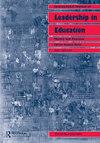校长教学领导实践在预测教师心理赋权中的作用:以埃塞俄比亚东Gojjam省为例
IF 2.5
Q1 EDUCATION & EDUCATIONAL RESEARCH
International Journal of Leadership in Education
Pub Date : 2023-09-11
DOI:10.1080/13603124.2023.2255574
引用次数: 0
摘要
近年来,教学领导被认为是全球教育领域的一种有效方式。即使实践教学领导可以提供资本来促进教师的心理授权,但迄今为止还没有在埃塞俄比亚的背景下对这个问题进行过研究。因此,本研究旨在探讨校长的教学领导实践在教师意义感、能力、影响力和目标内化方面对教师心理授权的预测作用。采用相关调查模型设计。这项研究是在埃塞俄比亚东Gojjam省进行的。通过问卷调查收集420名教师的数据,并通过SPSS 25进行分析。对教学领导和心理授权量表进行效度和信度检验。因此,根据教师的观点,简单相关分析的结果显示,教学领导的各个维度与心理授权的各个维度之间存在着中等到强烈的正相关关系。最后,校长的教学领导实践显著预测教师的心理授权。除了在理论和文献上的贡献外,本研究还从实证上强调了教师心理赋权;应考虑发展教师的各种资本。本文章由计算机程序翻译,如有差异,请以英文原文为准。
The role of principals’ pedagogical leadership practice in predicting teachers’ psychological empowerment: the case of East Gojjam province, Ethiopia
Recently, pedagogical leadership has been regarded as an effective style in the education sector across the globe. Even if practicing pedagogical leadership makes capital available to foster teachers’ psychological empowerment, no previous study has done on this issue so far in the context of Ethiopia. Thus, this research was undertaken to explore the role of principals’ pedagogical leadership practice in predicting teachers’ psychological empowerment, in terms of teachers’ sense of meaning, competence, influence and goal internalization. The correlational survey model design was used. This study was conducted in East Gojjam province, Ethiopia. Data were collected from 420 teachers through the questionnaire and analyzed through SPSS 25. The validity and reliability of the pedagogical leadership and psychological empowerment scale were checked. As a result, according to the views of teachers, the results of simple correlation analyses showed there were a moderate to strong, positive and significant relationships between each dimension of pedagogical leadership and each dimension of psychological empowerment. Finally, principals’ practices of pedagogical leadership significantly predicted teachers’ psychological empowerment. In addition to, its contribution to the theory and literature, this study also empirically highlighted that to make teachers psychologically empowered; and developing various capitals of teachers should be considered.
求助全文
通过发布文献求助,成功后即可免费获取论文全文。
去求助
来源期刊

International Journal of Leadership in Education
EDUCATION & EDUCATIONAL RESEARCH-
CiteScore
5.10
自引率
14.30%
发文量
65
期刊介绍:
International Journal of Leadership in Education: Theory & Practice is an international journal for the publication of theoretical and practical discussions of educational leadership. The Journal presents: •cutting-edge writing on educational leadership, including instructional supervision, curriculum and teaching development, staff development, educational administration and more; •an alternative voice: reports of alternative theoretical perspectives, alternative methodologies, and alternative experiences of leadership; •a broad definition of leadership, including teachers-as-leaders, shared governance, site-based decision making, and community-school collaborations.
 求助内容:
求助内容: 应助结果提醒方式:
应助结果提醒方式:


